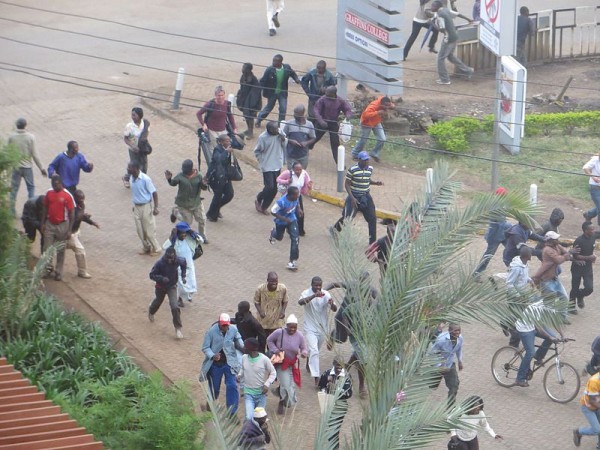I had joined my fellow members of ‘Sitarusha Mawe Tena Peace Campaign’ and several partners in marking the ‘International Day of Peace’ on the 21st September, 2013 when news of the attack at the Westgate Mall came in. We had decided to mark the day by holding a cleanup exercise in Kibos market – a centre considered as a violence hotspot in the area.
It was announced over the radio that there had been an explosion at a shopping mall in Kenya’s capital of Nairobi, about 334km away from Kisumu, of course it caught our attention but we thought less of it. Such attacks had become common in the capital city of Kenya. But as more news continued to flow in, and it was apparent that the attackers had held the Westgate Mall and the people inside as hostages, it seemed unbelievable. Some of my friends even brushed it off as a prank on the government.
When it was confirmed that the incident was a terrorist attack and many lives had been lost, the country was engulfed with grief and panic. All media houses were now covering live from the scene as well as sending appeals to the public to donate blood to the casualties. Donation centers were opened countrywide. Volunteers rushed to the scene to assist the medical and security personnel in rescuing efforts and they brought along food donations as well. Kenya had never witnessed such a scenario.
Security apparatus battled for four days with the terrorists, with shootouts only seen in movies until they finally fully occupied the mall albeit after a lot of damages and loss of both lives and property. Official figures indicated that about 72 lives had been lost including those of young children and pregnant women and 6 security personnel, over 200 people had been reported injured and 68 more still missing. Even though the figures were conflicting, the Kenya Red Cross recently published through the media that about 60 people died, 234 injured and only 22 more still missing.
But the incident raised some critical underlying issues which I felt should not go unmentioned because they are spiraling out of control. The religious differences have awakened extremism in some areas. This is very detrimental to national development. It became clear that the attack was executed by people dressed as Muslim terrorists, and they were asking Islamic questions to the hostages and only letting go of those who answered correctly. A feeling engulfed the nation that aroused religious stance
On October 4th, 2013, a Muslim preacher sheikh Ibrahim Ismail was shot dead by as yet unidentified assailants in the coastal city of Mombasa, a region highly populated with the Muslim faithful. It sparked wide protest leading to the burning of a Salvation Army Church. Thereafter, two Christian pastors were killed in unexplained circumstance. Vikwatani Redeemed Gospel Church Pastor, Charles Mathole was found shot dead in his church seat early Sunday morning on the 20th of October, 2013, in Kilifi. The following day, another pastor, Ibrahim Kithaka’s body was found in a thicket. This again led to protests in the area. The pastors in the region are now asking the government to allow them to be issued with firearms for their protection. Such news has been also witnessed in the northeastern towns of Garissa, Mandera and Wajir.
But the important question is: is Kenya slowly headed into a full-scale religious war? Is the country ready to witness such incidences as those common in the sister state of Nigeria? How come nobody seems interested to address the underlying issues?
Even though several efforts have been initiated at the local level to bring together the two faithful by organizing joint prayer meeting in their various worship houses, a lot still needs to be done including having the political and government goodwill and support. Religious tolerance is necessary for continued growth and peace and the whole world should not just sit back and watch as Kenya sinks in this never ending violence. Otherwise Kenya will soon be a state of two warring religious faiths, with continuous terrorist attacks and retaliations. Religious extremism will escalate to souring numbers and it will be difficult to control it. It is my humble opinion that cohesion should be promoted early in the country.










